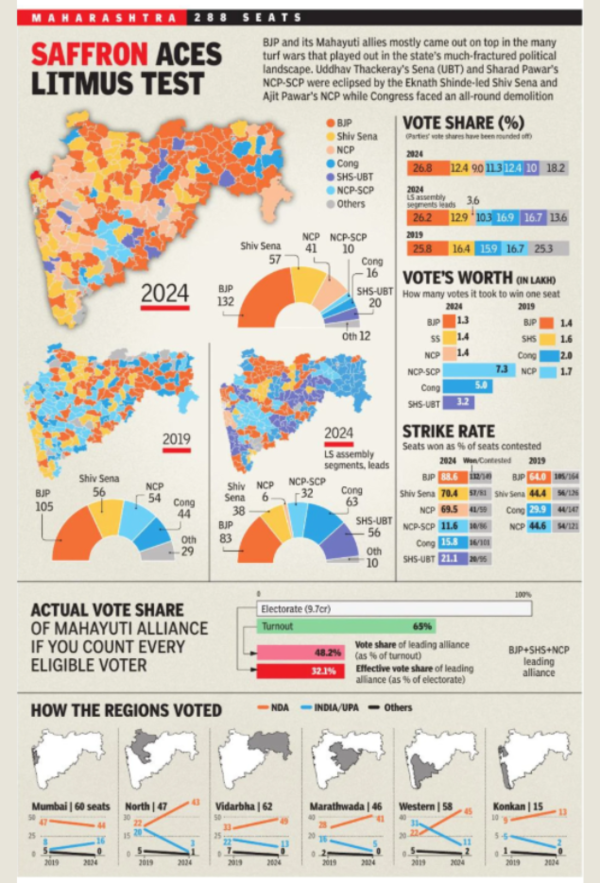NEW DELHI: After surprise setbacks in several key constituencies in Maharashtra in Lok Sabha polls this year, BJP found itself at a crossroads, needing to recalibrate its strategy to regain lost ground. Polarisation of Muslim votes against it led to significant losses for BJP in at least seven constituencies in the Lok Sabha polls that included Dhule and Mumbai North-East, where the saffron party had previously enjoyed strong support.
In the wake of these results, BJP, under the leadership of PM Narendra Modi, initiated a campaign aimed at not just reclaiming these lost territories but also redefining its image. The PM introduced a new rallying cry, “ek hain to safe hain” (together we are safe), a slogan designed to resonate with the Hindu electorate, emphasising unity as a defence against division. This was not merely about communal unity but was portrayed as a broader appeal for national cohesion under BJP’s stewardship. The call seems to have resulted in silent consolidation of Hindu votes in favour of BJP and its allies.
The slogan was a direct counter to the narrative set by the opposition and was complemented by another slogan from UP CM Yogi Adityanath, “batenge to katenge” (divided we fall), which further hammered the message of unity for survival. These slogans were intended to reassure Hindu voters in areas where they felt their political influence was waning due to consolidation of minority votes.

BJP’s narrative was bolstered by the activities of Muslim clerics, who called for Muslim votes to be consolidated behind the Maha Vikas Aghadi (MVA). This move was seen by BJP as an opportunity to validate its call for Hindu unity. The demands from National Ulema Council, Maharashtra, and All India Muslim Personal Law Board member Sajjad Nomani, which included quotas for Muslims in govt contracts and preference in recruitment for police forces, only intensified BJP’s campaign.
Opposition from Hindu seers was swift, interpreting these demands as divisive. The political atmosphere was already charged when protests by Muslim youth in front of ‘Matoshree’ forced Shiv Sena (UBT) to reconsider its position on the waqf bill, highlighting the delicate balance of communal politics in the region.
As the election campaign progressed, BJP’s strategy evolved into a narrative of safeguarding cultural and national unity against perceived threats of division. Party leaders, including PM, engaged in a series of rallies and meetings, emphasising the importance of standing together. The narrative was clear: unity under BJP was the path to safety and progress for the Hindu community, and by extension, for the nation.
Saffron fountainhead RSS was also said to be proactive in the polls and it was evident when the two slogans were endorsed by its leadership. RSS chief Mohan Bhagwat, in his annual Dussehra address, called for Hindu unity and urged taking lessons from attacks on the community in Bangladesh. Senior Sangh functionary Dattatreya Hosabale also used the slogan “batenge to katenge”, amplifying the call for Hindu unity.
